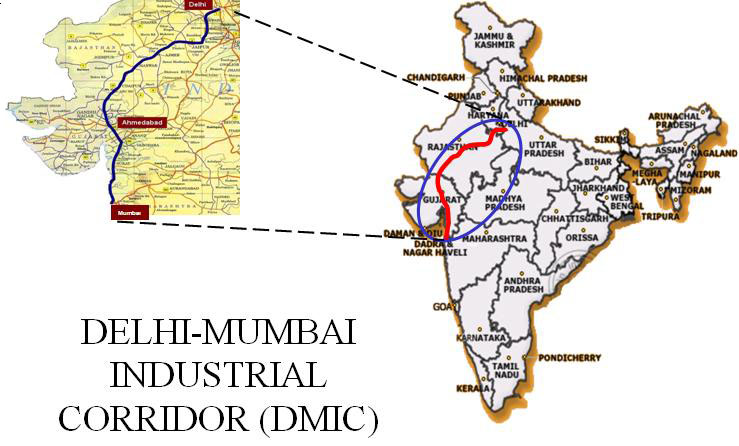Delhi Mumbai industrial corridor better known as DMIC is a mega Indo-Japanese USD 90 billion dollar (Rs. 4, 23, 000 crore) Infrastructure project, which is being touted as a game changer for the Indian economy. DMIC would be the biggest infrastructure project India has ever attempted in its history. The project will see phenomenal expansion of Industrial capacity and Infrastructure. Road, rail, port, air connectivity will get a boost in states that fall under the corridor. Many smart cities would be developed alongside the corridor besides making the existing one’s smarter, such as the Dholera SIR(special investment region) in Gujarat, which is aims to be 6 times the size of Shanghai and 2 times the size of Delhi.
The backbone of the project would be the ambitious ‘Western Dedicated Freight Corridor’ that would help cut the logistical costs of manufactured goods, de-congest the existing network and help make Indian goods cheaper and competitive.
India has traditionally been an Agriculture based economy which has just recently transitioned to become a Service based economy, however unlike the usual path that developed countries took to become developed (Agriculture to Manufacturing to Services) India jumped directly to Services from Agriculture, skipping the 2nd step(Manufacturing) all together. This lack of attention given to manufacturing sector has resulted in India not fully able to utilize its economic potential to become a great economic powerhouse that it should be. DMIC is the infrastructure project that it supposed to change all of this.
Not only DMIC will help solve the problem of lack of manufacturing in the country but it will also help solve the problem of India’s messy urbanisation. New cities being established along the corridor will help meet pressures of urbanisation and also lead India’s economic growth for next 20-30 years. The result will be a increased rate of urbanisation in the country & reduced burden on existing mega cities such as Delhi and Mumbai, bringing much needed relief to these cities. Urbanisation by the creation of new cities should be one of the top priorities of the government or else existing cities will turn into massive slums.
Given the stakes ‘you’ the reader will think that every sane minded Individual will support such a project, well you dear reader think wrong large sections of civil society and a number of intellectuals have declared a total war on this project vowing to do everything possible to prevent this project from successfully being implemented and achieving its goals.
Some noted social activists like Medha Patkar have even declared the project ‘unconstitutional’, as she felt it would affect the future of inhabitants of areas in six states through which the project will pass. Patkar went on to say that “It is perverted. You can’t affect their living conditions and create a huge structure there”. She further added that ‘Insisting that the full impact of the project has not been assessed by the DMIC authorities, Patkar said that the project will have to pass legal scrutiny or else it would be entangled in unlawful activities.
Large sections of Farmer community have also opposed the idea of their land being acquired for the corridor. Farmers are furious even at the mention of the possibility of their land being acquired for the Delhi Mumbai Industrial Corridor (DMIC). Farmers present the argument that the land that is being acquired has fed them for generations and will feed the generations which are yet to come, many farmers also have a emotional attachment to their land which makes it even harder to achieve the land acquisition targets, set by bureaucrats in New Delhi.
There are stories of successful land acquisition too, for example the land acquisition process in Maharashtra, has been very smooth, with little to no opposition, over 3, 500 hectares of farm land near Aurangabad. One of the biggest since the arrival of the 2013 UPA land acquisition law came into effect. The reason: double the local land rates, apart from separate compensation for associated Farm infrastructure and re-skilling of the farmers so that they too can benefit from the Industrial corridor.
DMIC is hugely critical for India to achieve its true potential as a great economic power as it once was. The government must make an all-out effort to insure that this ambitious project is completed on time and on budget. Efforts should be made to deliver a world class bureaucracy and laws which promote business rather than discourage it. Indian planners must focus on rapid urbanisation and industrialization, if India is to achieve its true potential
Featured Image Credits: http://dholerasir. com
